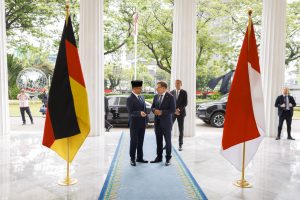Germany’s foreign minister said yesterday that China’s recent assertive actions in the South China Sea, as well as growing tensions over Taiwan, pose threats to international security that could also impact Europe.
In a speech to the Foreign Policy Community of Indonesia in Jakarta, Johann Wadephul said that “what happens in the Indo-Pacific has a direct impact on European security and vice versa.”
“China’s growing military assertiveness in the South China Sea not only threatens Asia’s security, but also undermines the international rules-based order as a whole,” Wadephul said, according to an official transcript of the speech. “And – with essential trade routes running right through this area – it also constitutes an economic risk.”
Wadephul’s warning comes at a sensitive time in the South China Sea, where China is increasing both the frequency and intensity of its incursions into waters claimed by the Philippines. This has led to a series of clashes between the two nations’ vessels, the most recent of which saw a Chinese navy vessel collide with (and seriously damage) a China Coast Guard patrol ship while the latter was pursuing a Philippine Coast Guard boat in the vicinity of Scarborough Shoal.
Wadephul’s comments, which followed a meeting with his Indonesian counterpart Sugiono, came on the second leg of his five-day trip to Japan and Indonesia, both of which Germany regards as important regional partners who share its support for the aforementioned international order and a desire for a free, fair, and balanced trade regime.
During a joint news conference with Wadephul, Sugiono said that the pair had held a “productive and constructive meeting” during which they had “discussed how to overcome geopolitical challenges and rising trade barriers,” according to the Associated Press.
In particular, Wadephul hailed the free trade deal between Indonesia and the European Union, which is due to be finalized next month, after a decade of sometimes fraught negotiations.
“In a world of crises and conflict, of trade restrictions and barriers,” it is vital “to set up a network of strong global partnerships,” Wadephul said, as per the DPA news agency. He said that the Comprehensive Economic Partnership Agreement between the EU and Indonesia could also potentially serve as a model for European trade with other regions.
Sugiono said that the CEPA “will further expand opportunities for cooperation, particularly in the economic sector, between the two countries to increase trade and investment,” the AP reported. He added that Germany has made a 1.6 billion euro ($1.8 billion) commitment to Indonesia’s renewable energy sector through the Just Energy Transition Partnership.
During his visit, Wadephul was also scheduled to visit a production plant operated by the German commercial vehicle manufacturer Daimler Truck, the German Foreign Ministry said in a statement.
The other major point of discussion was the situation in Gaza, with Wadephul calling for an immediate ceasefire between Israel and Hamas, and for the latter to release its remaining Israeli hostages. While Germany and Indonesia have long had divergent perspectives on the Israel-Palestine conflict – Berlin is a staunch supporter of Israel, while Muslim-majority Indonesia is a vocal international advocate of the Palestinian cause – both said that the humanitarian emergency that Israel’s assaults on Gaza had created was unbearable and called for a political resolution to the conflict.
“The goal for all of us is clear: a two-state solution, which must be negotiated,” Wadephul said. “There is now a very acute opportunity for conflict resolution in which many neighboring countries have contributed to this,” Wadephul said. “It would be in all of our interests if this political conflict could be resolved through a peaceful process.”

































